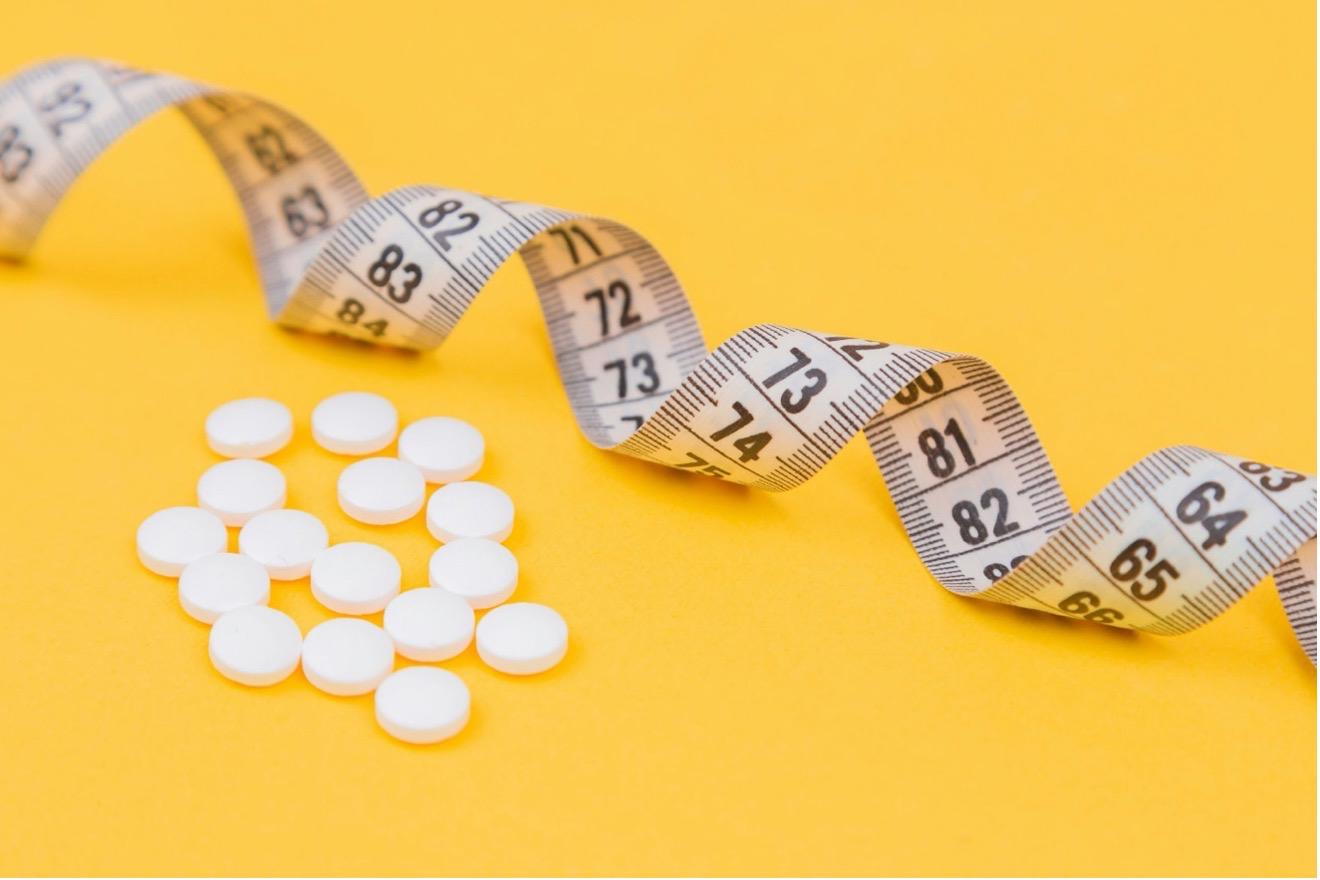
GLP-1 Injections is not the quick fix:: 6 Natural Alternatives You Need to Lose Weight
You must've heard of GLP-1, the trending medication that may help your friend to get fit into her old jeans, or your coworker to make his appetite disappear like magic.
All of this because of some injections or pills, Sounds tempting right?
But the reality is something else. These medications may drop your weight quickly. But the effect is not only limited to the weight. Many GLP-1 users experience fatigue, cramps, nausea, vomiting, and even muscle loss. Some even report depression and hair thinning. And the most common: as soon the use of injections stops, the weight often comes roaring back like it never left.
So, before you go diving into the world of these meds and injections, take a closer look at what these actually are, and why they may not be the actual solution for the weight loss. And most importantly, a natural and sustainable solution that works with your body, not against it-especially if you are suffering from insulin resistance.
What is GLP-1?
GLP-1 stands for Glucagon-Like Peptide-1. It is a hormone naturally produced in our gut when we eat. It helps regulate blood sugar by stimulating insulin, it slow down gastric emptying, and makes you feel full.
Pharmaceutical companies keep that concept in mind and make synthetic versions like Ozempic, Mounjaro, and Wegovy- to copy the GLP-1 effect and help people with diabetes manage their blood sugar levels and lose weight.
So, Does that Work?
Well, the concept of these drugs is to hijack the natural hunger signal of your body and make you feel full for longer. You will stop obsessing over food, eat less, and lose some weight. But there is also something that these advertisements don't tell you.
The fact is that GLP-1 drugs are not a long-term solution, especially for people who have insulin resistance as the root cause of their weight gain. And then there are the side effects of these medications and of course the cost. You may be paying a hundred or even thousands of dollars a month for a shot that comes with a side of nausea, bloating, and hospital visits.
What’s Really Inside These Drugs?
You must have seen the headlines of GLP-1 injections being hailed as a miracle weight loss solution. But while the spotlight shines only on the rapid results, there is a lot being left in the shadows, specifically what’s really inside these drugs.
Let’s talk about Ozempic and Wegovy for instance, both of these contain semaglutide as their active ingredient. A synthetic compound that mimics a natural gut hormone that regulates blood sugar and suppresses appetite. Sounds amazing right? But here’s the part you have rarely heard about:
These injections also contain some inactive ingredients like propylene glycol.
A chemical used as a solvent in antifreeze, de-icing solutions, and paints. It is also used in many pharmaceuticals and processed foods, but that doesn’t make it harmless. Research has shown even a small amount of propylene glycol can trigger liver, kidney, and nervous system issues. (Lim TY, 2014)
Not only this there are many other ingredients that can cause harmful effects if taken for a long time;
· Disodium Phosphate Dihydrate: Normally well-tolerated in small amounts, but a high dose over time may affect electrolyte balance, especially in people with kidney issues.
· Phenol: Can cause skin irritation, respiratory issues, or a burning sensation at the injection site. Large doses can lead to systemic toxicity.
While semaglutide is an active ingredient, these additives are also part of every injection. Most of them are considered safe in small amounts but that doesn’t mean they are free from risk, especially if used in the long run.
The Not-So-Glorious Side Effects of GLP-1 Drugs
GLP-1 is one of those meds that are not without their dark side. People have reported a long list of side effects, including :
· Nausea and vomiting
· Stomach pain
· Diarrhea or constipation
· Hair loss
· Pancreatitis
· Muscle loss
· Fatigue
· Depression and anxiety
According to a research letter published in the medical journal JAMA. The GLP-1 users have a strong association with health complications including Gastrointestinal Adverse Events (Sodhi M, 2023)
According to a 2022 study, the use of GLP-1 agonists in diabetic patients has shown a strong effect on pancreas and gastrointestinal activity. Some metabolic, hepatic, and cardiovascular effects were also observed. (Shetty, 2022)
The Science Behind the Side Effects
GLP-1 agonists like semaglutide, and trizepatide work by slowing down the gastric emptying and reducing appetite. This mechanism is effective for weight loss but it also leads to various physiological complications.
Impaired Gastrointestinal Function: When food stays In the stomach for a longer time it can cause the feeling of bloating and fullness. This late stomach emptying can cause discomfort and can trigger nausea. In some cases, if the food doesn't pass through the stomach properly it can cause gastrointestinal distress, leading to vomiting.
Disruption of Nutrient Absorption and Gut-Brain Signaling: The gastrointestinal sac plays an important role in nutrient absorption and also plays an important role in the gut-brain axis. Such interference with normal digestion can have a negative effect on neurotransmitter production – specifically serotonin, which is associated with low mood, fatigue, and even depression.
Loss of Body Mass: The weight you lose by taking GLP-1 is not just fats- it's your muscles as well. When your appetite suddenly drops your body starts to break down everything including muscle tissues to get enough fuel, which results in losing a big chunk of lean muscles. Moreover, when you stop taking these drugs, the appetite appears, and cravings come back but you don't have enough muscle to handle those calories, which results in rapid weight gain, even more than you lost.
Nutritional Deficiencies and Disordered Eating Pattern: Long-term appetite suppression can lead to limited calorie and nutrient intake, increasing the risk of nutritional deficiencies, fatigue, and lower immune function. Moreover, this pharmacologic hunger suppression can also promote eating disorders like anorexia.
Natural Alternatives You Need
That many side effects of just one medication, sound terrifying. Right? Well, taking the prescribed medication for your diabetes or obesity is saving your life, but if you want to take such medication just to drop some pounds take fewer calories. You might rethink.
Weight loss Is not just about cutting calories and suppressing your appetite, especially if you are insulin-resistant, you have some bigger metabolic work to do. And that's supporting your body's natural process not by altering it.
Luckily there are some natural and powerful alternatives that can help you lose that stubborn weight while managing your insulin resistance. And the best thing is that these won't have any frightening effect.
Let’s dive in.
1. Berberine: Nature’s Metformin
Berberine is a compound naturally found in several plants including barberry and goldenseal. This compound has been used for centuries in Ayurvedic and traditional Chinese medicines. And now the modern sciences have also caught up with the benefits of this compound.
Benefits:
Berberine has shown to:
· Improve mood and gut health
· Support healthy cholesterol and triglycerides
· Balance blood sugar levels
· Helps in weight loss and burning fats
· Reduce inflammation
What Science Says:
Berberine activates an enzyme called AMPK, also known as the "metabolic master switch". It basically turns your body into a fat-burning, sugar-clearing machine. This enzyme also improves insulin sensitivity mimicking the effects of fasting or exercise.
In fact, a 2008 study shows that berberine is as effective as metformin when it comes to lowering the blood glucose level in people suffering from type-2 diabetes. (Yin J, 2008)
Note:
Berberine is a bit powerful stuff, so consult your doctor before starting- especially if you are already on any medication. And takes it in cycles, for example, 8 weeks on, 2 weeks off.
2. Psyllium Husk: The Fiber Hero
Psyllium husk might not be glamorous, but it's a highly effective, and evidence-based supplement that helps in reducing blood sugar levels while supporting digestive health, especially for people suffering from insulin resistance and cravings more often.
Benefits
Psyllium has been shown to:
· Reduce blood sugar and insulin levels
· Support weight loss
· Help cholesterol levels
· Keeps you feeling full longer and suppresses cravings
What Science Says:
Psyllium is a soluble fiber that forms a gel-like substance in your digestive tract. It slows down the digestion and the absorption of carbs, which prevents blood sugar spikes after the meal. According to a studypublished in the American Journal of Clinical Nutrition, taking psyllium with meals significantly reduces glucose and insulin levels, and reduces the risk of glucose spikes. (Pastors, 1991)
Note:
Start slowly to avoid bloating, and make sure to drink plenty of water. Start with 1 tablespoon of psyllium in a glass of water before the meal. Stir it quickly and drink fast (as it thickens fast).
3. Curcumin: The Golden Anti-Inflammatory
Found in turmeric, curcumin is an active compound extensively studied for its therapeutic properties. Its anti-inflammatory and antioxidant properties support healthy glucose metabolism and enhance insulin sensitivity.
Benefits:
Anti-inflammatory properties of curcumin help in:
· Relieving symptoms of arthritis (both osteoarthritis and rheumatoid arthritis)
· Managing inflammatory and degenerative eye disorders
· Lowering the risk of cardiovascular disease
Antioxidant properties help in:
· Healing acute kidney injuries
· Reducing seasonal allergy symptoms including sneezing itching and congestion
· Increasing brain and joint health
What the Science Says:
A 2012 randomized controlled trial in diabetes care found that curcumin supplements reduced the progression of prediabetes and also found significant in treating type 2 diabetes. (Chuengsamarn S, 2012)
Curcumin works by lowering the inflammation in the body which contributes to insulin resistance. It also increases insulin receptor activity at the cellular level.
Note:
You can have curcumin by simply adding turmeric to your food. You can also make golden milk, by adding cinnamon, ginger, turmeric, and a dash of black pepper into almond milk. A cozy and healing drink.
4. Green Tea Extract: A Way to Better Metabolism
Green tea extract. Derived from the leaves of Camellia Sinesis, is a well-researched natural compound known due to its metabolic benefits. The extract is packed with catechins- especially EGCG that help with improving insulin sensitivity, reducing fat, and increasing metabolism.
Benefits:
Green tea extract can help with:
· Boosts metabolism
· Reduce belly fat
· Contain antioxidants
· Improve insulin function
· Support heart and brain health
What the Science Says:
According to randomized controlled trials published in The American Journal of Clinical Nutrition, the green tea extract significantly reduced fasting insulin and improved insulin resistance in obese people. (Liu, 2013)
Studies have also shown the ability of green tea extract to reduce belly fat due to its ability to increase fat oxidation. (Hodgson, 2013)
Note:
Drink 2-3 cups of green tea daily or take green tea extract supplements with at least 200-400 mg of EGCG. Don't take it late in the day especially if you are caffeine sensitive.
5. Dietary Changes: Food is Your First Medicine

While supplements can provide targeted support there cannot be a substitute for a well-balanced and nutrient-rich diet. And when it comes to insulin resistance, dietary choices play a central role. Whole, and unprocessed foods- especially those with low glycemic impact can significantly improve insulin sensitivity and also support metabolic health. On the other hand, a diet high in crab, sugar, and processed food can spike blood glucose and increase chronic inflammation.
So, your food choices can either fuel the fire or put it out completely.
Benefits
Whole, unprocessed, and healthy food choices can help in:
· Stabilizes blood sugar level and reduces insulin spike
· Keeps you full for a longer
· Nourishes your body
· Balancing hormones
· Supports gut health and reduces inflammation
What the Science Says:
The main trigger behind insulin resistance is a diet high in carbs, sugar, and processed foods. These keep your insulin level high all day making it impossible to burn fats. But when you swap those foods with something whole, unprocessed, and nutrient-dense, your body starts to heal, your energy feels to return and your cravings start to disappear.
Studies have also shown that low-carb, high-fiber fiber, and whole-food diets can help with insulin sensitivity, reduce fasting insulin, and also support long-term weight loss. (Kumar NK, 2022)
What to Eat More of:
· Vegetables: Leafy greens, non-starchy, and cruciferous
· Healthy fats: olive oil, nuts, and seeds
· Low-glycemic fruits: berries, apples, peaches
· Lean protein: fish, legumes, chicken
· Fermented foods: pickles, kimchi, yogurt
What to Eat Less of:
· Refined carbs: pasta, white bread, pastries
· Sugary drinks, even homemade natural ones
· Seed oils like corn, canola, and soybean
· Ultra-processed snacks and frozen meals
6. Body Balancing System Drops
These are homeopathic products with a purpose. The only healthy and all natural program proven to not only lose weight 2X faster, give you more energy and assists with gut health, hormone balancing. These products in conjunction with just eating real food (JERF) off the approved food list, moderate exercise, drink ½ your body weight in water, cut out junk, fast food and snacking, detoxing your body from heavy metals with our supplement Restoriix and if you are an Italian carboholic like me you will need Sugar Stop supplement. We have the supplements for you to succeed or please try any of the other five suggestions mentioned here. If you are interested in the body balancing drops after reading this article I wrote feel free to text me: (770) 369-3606 or dm me on facebook-https://www.facebook.com/@eastcobbpremierspa or IG-@premierwellnessatl.
Note:
This is not about going keto, carnivore, paleo overnight or starving yourself to take fewer calories. It's about learning to eat in a way that will support your metabolism instead of sabotaging it. Simple and small things like swapping your cereals for eggs, or sugary drinks for sparkling water can make a huge impact over time.
And the best part? No injections, no side effects. Just eat real foods that you will enjoy having.
References
Chuengsamarn S, R. S. (2012). Curcumin extract for prevention of type 2 diabetes. Diabetes Care, 35(11). doi: 10.2337/dc12-0116
Hodgson, A. B. (2013). The effect of green tea extract on fat oxidation at rest and during exercise: evidence of efficacy and proposed mechanisms. Advances in nutrition (Bethesda, Md.), 4(2), 129-140. doi:https://doi.org/10.3945/an.112.003269
Kumar NK, M. J. (2022). Kumar NK, Merrill JD, Carlson S, German J, Yancy WS Jr. Diabetes Metab Syndr Obes, 18(15). doi: 10.2147/DMSO.S292742
Liu, K. Z. (2013). Effect of green tea on glucose control and insulin sensitivity: a meta-analysis of 17 randomized controlled trials. The American journal of clinical nutrition, 98(2). doi:https://doi.org/10.3945/ajcn.112.052746
Pastors, J. G. (1991). Psyllium fiber reduces rise in postprandial glucose and insulin concentrations in patients with non-insulin-dependent diabetes. The American journal of clinical nutrition, 53(6). doi:10.1093/ajcn/53.6.1431
Shetty, R. B. (2022). Adverse drug reactions of GLP-1 agonists: A systematic review of case reports. Diabetes & metabolic syndrome, 16(2). doi:https://doi.org/10.1016/j.dsx.2022.102427
Sodhi M, R. R. (2023). Risk of Gastrointestinal Adverse Events Associated With Glucagon-Like Peptide-1 Receptor Agonists for Weight Loss. JAMA, 330(18). doi:10.1001/jama.2023.19574
Yin J, X. H. (2008). Efficacy of Berberine in Patients with Type 2 Diabetes. Metabolism, 57(5). doi:10.1016/j.metabol.2008.01.013
DISCLAIMER-This article does not constitute medical advice for any individual. Please consult with your physician.
